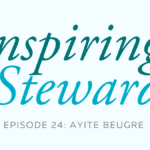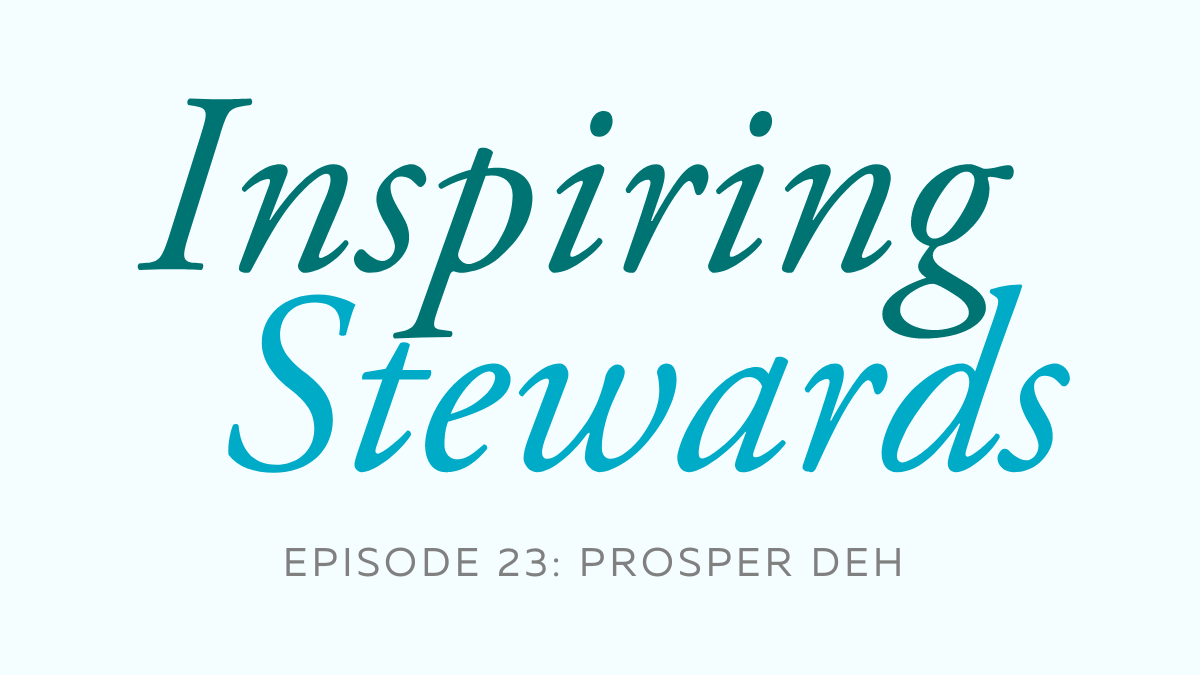
Eurasia July 2023 Field Report
July 18, 2023
Ayite Beugre – Spreading the message of generosity to widows and orphans
August 24, 2023Encouraging Christians to pray and work to make the world better
ABOUT THIS EPISODE
In this twenty-third episode of the Inspiring Stewards Podcast, Nathan Jones speaks with Dr. Prosper Deh from Togo, Africa. Dr. Deh serves as the Francophone Africa regional representative for the African Council for Accreditation and Accountability (AfCAA). He sees stewardship as our responsibility from the personal to the organizational to the national to the global level, where Christians have to embody values like honesty, love, forgiveness, justice, and solidarity in their life. He concludes by challenging Christians to not just pray but also work to make this world better.
We’d love to hear your thoughts, comments, or feedback. To do so, email us at [email protected].
The music is Concerto a’ 4 Violini No 2 by Telemann played on classical guitar by Jon Sayles. Published by Exzel Music Publishing.
Length: 15:02
TRANSCRIPT
NATHAN JONES
This month, we head back crossed the Atlantic to Togo, Africa to meet Dr. Prosper Deh. Dr. Deh serves as regional representative for AfCAA, the African Council for Accreditation and Accountability. Dr. Deh brings a unique perspective on the role of stewardship in the church both locally and around the world.
I’m your host, Nathan Jones, and once again, thank you for joining me on this episode of Inspiring Stewards podcast.
Dr. Deh, thank you again for taking time to join me today. I've been looking forward to this conversation for some time. So, let me ask you. Tell us about your educational and your professional background.
PROSPER DEH
I have been schooling in Togo. I did literature. First of all, a bachelor degree, then master degree, later on doctorate degree in comparative literature. In terms of professional background, I first worked as a French teacher at the grammar school level.
Then later on, I moved to publishing after the doctorate degree. And I worked in Cameroon for eight years in a publishing house owned by the Protestant churches coming from Central and West Africa.
Later on, I came back to Togo for almost one year. Then, I moved to Kenya where I worked with the All-Africa Conference of Churches, in charge of ecumenical relations, in charge of research, in charge of publication, and also in charge of what is called African peer review mechanism.
Later on, I moved to Togo continuing working with the All-Africa Conference of Churches, because the AACC has a regional office here in Togo, where I worked also for a certain number of years.
Then, worked with the churches in Togo on a project aiming at promoting governance within the church, but also within the nation so that the voice of the churches on the issues pertaining to governance can be heard. That was my last post before retiring four years ago.
So, I worked with for the church for 34 years. I am a church worker. I must also say that, in fact, I have been benefited from a scholarship given by my church. So, that is a bit of my background.
NATHAN
That's wonderful. Tell us how you came to a personal relationship with Jesus and what impact that then had on your life.
PROSPER
I was born in a Christian family. My grandfather was the pastor of the Evangelical Presbyterian Church, which is my church. And my uncle was also a pastor. But I would say that my faith got strengthened later on and I felt much closer to God when I was going through some challenges in my life, especially when I lost my wife. It, ironically, I should say, gave me the change to taste God’s love that really strengthened my faith.
NATHAN
Thank you for sharing. I know that's hard. Seeing God's fingerprints in your life is a powerful thing, for sure.
Well, give us an overview of what your ministry looks like today. You're retired, you said, but I don't think you're not sitting around bored.
PROSPER
No, I have remained actively involved in church matters at national level with my church, bringing expertise, counseling, advice at the leadership of the church, also training.
At continental level, I was blessed to know African Council for Accreditation and Accountability (AfCAA). I was approached by the founder, Valentine Gitoho, when she was founding AfCAA, and looking for people coming from outside Kenya so that it is an African organization instead of being a Kenyan national organization.
That is how I got to know AfCAA and went to the first meeting and sat on the council which was given the task to pilot the organization at that stage. Later on, I was board member of AfCAA.
And then when there was the need to have a representative for Francophone Africa, I offered to step down from the board so that I can work as a regional representative and make AfCAA better known in Francophone Africa.
So, I have been journeying with AfCAA since, I think, 2013. So, now I am the regional representative for Francophone Africa, trying to make AfCAA known and trying to bring churches to get accredited.
NATHAN
Dr. Deh, how many countries make up that part of Africa, the francophone region?
PROSPER
The French-speaking countries in Africa are beyond 20. But my scope is limited to five countries: Togo, of course, Benin, Burkina Faso, Côte d'Ivoire, and Cameroon. Those are the five countries I have been focusing.
But whenever we organize webinars, we have participants from other countries, even from Burundi, D.R. Congo, Niger, Mali, Senegal, Madagascar. But in terms of work, I have been focusing on those five countries.
NATHAN
What are one or two of the challenges that you have seen AfCAA been able to address that are maybe unique to that part of Africa or maybe even more general in Africa, but you're seeing challenges in your area?
PROSPER
I think that one of the the most important challenges churches have been facing, especially in Africa is related to the issue of governance. How do the churches reflect stewardship? How do they reflect the value incarnated in the gospel? How dothey manage the good God has entrusted them? I think those are the issues the churches in Africa have been battling with.
NATHAN
So, this is the Inspiring Stewards podcast. How are you seeing the concept of stewardship play out maybe in your own life or what you've just described of how churches are even experiencing what that means to properly govern and manage what God has given them?
PROSPER
First of all, in my personal life, I think there is a responsibility in terms of testimony. Does my life reflect Christian values: honesty, love, forgiveness, reconciliation?
When I go to the church level, how does the church reflect church actions, decisions? How do they reflect justice? How do they reflect solidarity? Again when it comes to management, does our management reflect Christian values? We all know that corruption exists even within the church. So, how do we face those challenges?
When I go to the level of the country, Christians are also citizens. So, I think they have a role to play in their countries. It is true that we have to pray, but I don't think that getting involved in activities are contrary to prayer. We have to pray, but we also have to act.
So, how do Christian citizens participate in the building of the country in terms of defending human rights, in defending democracy, in terms of protecting people whose rights have been denied?
How do we relate to our culture? W hen you read the manifesto of the Lausanne Movement, the issue of culture was there. Missionaries came to us to bring us the gospel. That is right. But we have to question the way the gospel was brought in terms of respect of our own culture. As far as they don't antagonize the gospel, I think there is something to do there.
When I go to the African level or even at worldwide level, when we look at the relations between nations, what do we do? We just sit there. We just look at injustice. What do we do? We pray, okay. But can't we do more and go beyond prayer? Refugees around the world, what do we do?
I think there are challenges there for us as Christians so that we make sure once again that the wealth given by God is well-managed. It is not stolen by some people at the expense of others. Churches have something to do there.
NATHAN
That’s wonderful. Very full picture of what that looks like where it starts with us and it leads to a global impact.
So, you've already shared a little bit about this but the next question I want to ask is your observation on how God is at work in your local context and/or globally. How are you seeing Him in this unique time in history at work?
PROSPER
At the local context, I have witnessed the expansion of the gospel expressed by more and more people who embrace the gospel. Because they have been disappointed. They have been diffused by ideologies. They have been diffused by philosophies. They have found themselves vulnerable and they realized that there is one single Refuge. There is onesingle Creator who can rescue them, which is God.
Beyond the local level, I think we have also witnessed that expansion. You know, men thought they could rebuild the world like they want because of technological inventions. But we have realized that our technologies, our inventions do not resolve all the problems we have been facing. Contrary, they have even been part of the problems because we don't use those technologies in a good manner. We have been using them rather in a bad way.
I think that the kind of belief the human beings had in the 20th century, in the 19th century, when they thought they were very powerful, they could do everything. I think that with time, we have realized that we are very much vulnerable. We have to come back to God so that we can ask for the right direction, so that we can really embrace Christian values and love each other.
Because what does it mean to accumulate wealth? When you look at your country, where you have so many people who are rich and you have also a large number of people who are poor. Okay, we can say that they have to fight. We should not be encouraging laziness.
But when we go beyond, can the church, can human beings show more solidarity toward those who are weak, those who are poor? When we read the gospel, according to Paul, we are taught that people were sharing their goods. They used to bring together all what they have and they share according to the needs of everyone. I think there is something there we can recall and relive.
NATHAN
Wonderful. Any final words, Dr. Deh, you have for those listening today?
PROSPER
My final word will be that we are not from this world, rightly said. But for the time being, we are living here. We have the responsibility of trying our best to make this world function better as far as we can. Knowing that, only grace will make us find salvation. We will not be saved because of the good actions we will have performed.
But having said that, we have responsibility to play. We have roles to play during our time of life before going to heaven. So, I will personally encourage people to go beyond a kind of contemplative faith. Pray but also work. Pray and act.
NATHAN
Wonderful. Dr Deh, thank you so much for your time today.
PROSPER
Thank you, Mr. Jones. It was a pleasure for me.




